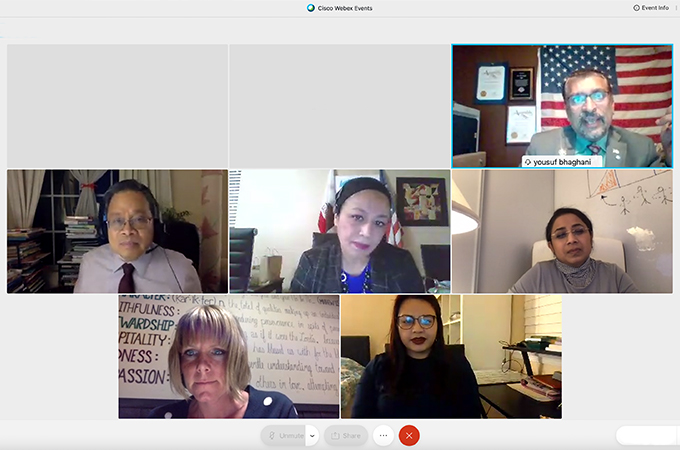How can educators and other local leaders work to combat Islamophobia in their communities? On February 24, the School of Education’s Center for Educational Justice hosted a webinar to help find answers to that question.
“After 9/11, the media coverage of terrorists and warfare in the Middle East really intensified prejudices and strongly affected the Muslim community,” said Center for Educational Justice Director Jose Lalas. “Our prejudices toward others guide our thoughts, organize our values, and influence our actions, and, when we act on them, we are discriminating.”
The virtual event featured three panelists: Fauzia Rizvi, an engineer who grew up in Pakistan; Maha Rizvi, Fauzia’s daughter; and Yousuf Bhaghani, an entrepreneur, activist, and former president of the Islamic Society of Corona Norco. They spoke with facilitators and Professors Jose Lalas, Mousumi De, and Heidi Strikwerda about their lived experiences, community involvement in the Inland Empire, and the ways school curriculum shapes the perception of different cultures.
Before the conversation began, Strikwerda shared a passage from activist Malala Yousafzai’s memoir, I Am Malala: The Girl Who Stood Up for Education and Was Shot by the Taliban. The passage explored the conservative Muslim culture in Pakistan and the expectations placed upon Muslim women.
“This is the story of our mothers,” said Fauzia. “It’s all about historical context. The religion tells us to be modest, but it’s up to us to determine what that means in our personal lives.”
In 2020, Fauzia made history when she became the first Muslim elected to public office in the Inland Empire, securing her position as director of the Western Municipal Water District. During her campaign, she received death threats and had to be accompanied by security personnel to ensure her safety.
“Before 9/11, there wasn’t a lot of awareness about Muslims in the U.S.,” said Bhaghani. After September 11, however, he was followed by members of the FBI and asked to become a Muslim informant for the government. At the time, Bhaghani was working with the city of Corona on plans to build a mosque and faced heightened levels of hostility from officials.
Maha was a 4th grade student on September 11, 2001. While she recalls not being able to fully grasp the consequences of the attack at the time, she was bullied and discriminated against for being Muslim throughout her schooling. “One thing I wish I could do is go back and speak up for myself,” she said.
The three panelists also spoked about the December 2015 attack on the Inland Regional Center in San Bernardino, which led to increased anti-Muslim sentiment in the Inland Empire. Bhaghani, who was president of the Corona mosque at the time of the shooting, echoed Fauzia’s earlier remarks: “It has nothing to do with what your religion tells you,” he said. “It has to do with your interpretation of it.”
De, whose background is in peace education, agreed. “Asking about the difference between Muslims and Islam is like asking about the difference between Christians and Christianity,” she said, noting that there is a wide knowledge gap about Islam as a religion and Muslim culture. De emphasized the importance of an open and continuous dialog in order to raise awareness of Islam and Muslim people.
After talking about their experiences, the panelists spoke about the organizations and initiatives they’re involved in now. For Fauzia and Bhaghani, service is the great equalizer. Early in the pandemic, Fauzia began sewing masks to meet the need of doctors and other essential workers in her community. By June 2020, she had distributed 20,000 homemade masks to senior centers, hospitals, and other community centers. Bhaghani worked with his local mosque to organize food drives and has distributed 4 million pounds of food across the region.
In closing the conversation, the panelists talked about the role of schools in combating Islamophobia and raising the profile of Muslim culture in the region. They encouraged audience members to expand their thinking with more events and webinars in which students and educators can have candid conversations with each other. Maha also acknowledged the importance of making sure that curriculum materials are accurate and objective so that students are presented with correct information.
Ultimately, it all comes down to making an effort to understand each other. “Humanity comes first,” said Bhaghani. “We all feel the same pain. We face the same issues. We’re all human beings.”
Learn more about the School of Education.






